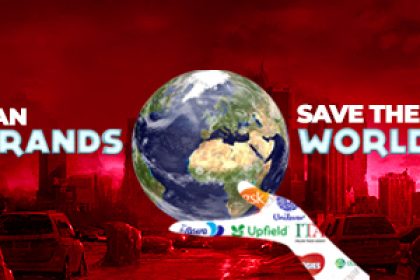Can Brands Save The World?

The safety of our ecosystem like never before is generating serious debates across the globe. Environmental activists have been very persistent with their call on states of the world to make deliberate efforts at saving the climate. Climate change resulting from excessive heat caused by greenhouse pollution keeps raving countries across the continent. The recent catastrophe witnessed by countries like Australia in recent months leaves a lot to ponder on what may be left if such disaster persist-all because of the activities of man!
Amidst these challenges are the activities of brands across the globe. With the United Nations constantly reminding countries to formulate and implement policies in line with the 2030 sustainable development goals, the activities of corporate organizations and how much they are willing to adhere to the clarion call of the UN remains a talking point.
A question that keeps re-echoing is what brands can do to be seen as a good citizen of the world. May be not showing up like a hero in a movie but by just been attentive to the voices around the world that are calling for caution. They must be seen as deliberately contributing to saving the world from problems like climate change, pollution, diminishing resources among others. Unfortunately, recent reports do not state this.
In a global survey carried out by Accenture & Havas Media states that out of 30,000 consumers, 72% of people said that business is failing to take care of the planet and society as a whole.
Eric J. McNulty an associate director of the National Preparedness Leadership Initiative wrote that brands saving the world have to do with them making sacrifices. According to him “Brand sacrifice” means companies, not consumers, feel the pain. He said for some companies, the opportunity both to address the world’s problems and to attract more customers lies in letting individuals do what they have always done well — consume — and having the brands make sacrifices instead.
Another report from TrendWatching showed that an increasing number of brands are willing to undertake the costs necessary to reverse social ills, and more, without affecting the consumer’s consumption habits. They call it “brand sacrifice.”
Brand sacrifice can be categorized into three namely; Sacrificing for the self, Sacrificing for the society and Sacrificing for the planet. The question is, have brands been able to achieve any of these sacrifices? Well some brands have been able to demonstrate sacrifice to their consumers.
Brands like CVS, a U.S drugstore chain was able to stop the sales of cigarettes and tobacco-related products conflicting with their role as a healthcare company from all their stores. The company predicted that the decision will cost about $2 billion in annual revenue.
Intel also stopped the use of minerals such as gold, tungsten from conflict zones as Democratic Republic of Congo to build microprocessors and have urged firms in the technology industry to follow suit in sourcing for the materials needed from conflict-free countries.
Another is Levi’s initiative of “A Care Tag for Our Planet”. It was designed to divert approximately 23.8 billion pounds of unwanted clothing and textiles that goes into U.S landfills each year. They thereby partnered with another company Goodwill Industries international, for used clothes to be donated to them. Donating to Goodwill not only diverts unwanted items from landfills but also helps people who need it most in local communities. The company promoted the initiative by sewing “A Care Tag for Our Planet” on their Levi’s to sensitize people to donate used clothes as a way to extend the life cycle for clothing and also reduce the environmental impact of caring for clothes.
In Nigeria, GlaxoSmithKline came up with the “No Poverty” initiative asides other initiatives they have. According to GSK, the biggest contribution to support those in vulnerable situations such as humanitarian disasters, is through product donations of their medicines and vaccines.
Over the years, Guinness Nigeria has recorded some initiatives that has helped save lives such as providing for over 5,000 persons with year round access to drinking water in partnership with WATERAID. The Company also trained 1,086 female farmers in 15 communities in Edo State on sustainable agricultural methods for alternative supply of raw materials used in Guinness’s supply chain among others.
Much as some brands are making efforts to save lives, some are however, not doing much in that regard. Reports from Independent.ng shows that global annual waste generation, driven by rapid urbanization and growing populations, is expected to rise up to 3.4 billion tons over the next 30 years, up from 2.01 billion tons in 2016, which experts say portends real danger for the fate of humanity.
This report notes that plastics are especially problematic, adding that if not collected and managed properly, they will contaminate and affect waterways and ecosystems for hundreds, if not thousands, of years. This indiscriminating dumping of plastic waste is a major factor for environmental disasters recorded annually by citizens.
Incidentally, fast moving consumer goods companies (FMCG) rely on plastic to deliver their products. The result of this is that communities are left to shoulder the cost of taking care of these non-degradable materials. For instance, a brand audit conducted by SRADeV Nigeria shows that out of 2,166 plastic materials gathered, about 58% were from 171 known brands. In view of the challenges facing the continued existence of the human race, can brands be deliberate with sustainable production in view of the global quest to save the climate?
Meanwhile, whatever the business, one thing is sacrosanct- we all have capacity to save the world.






